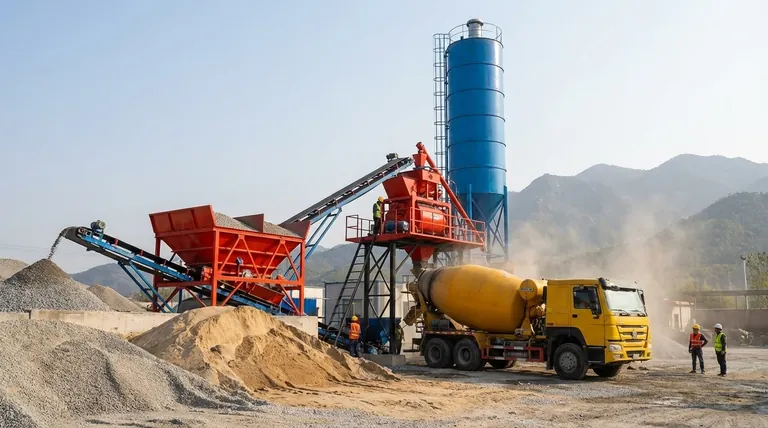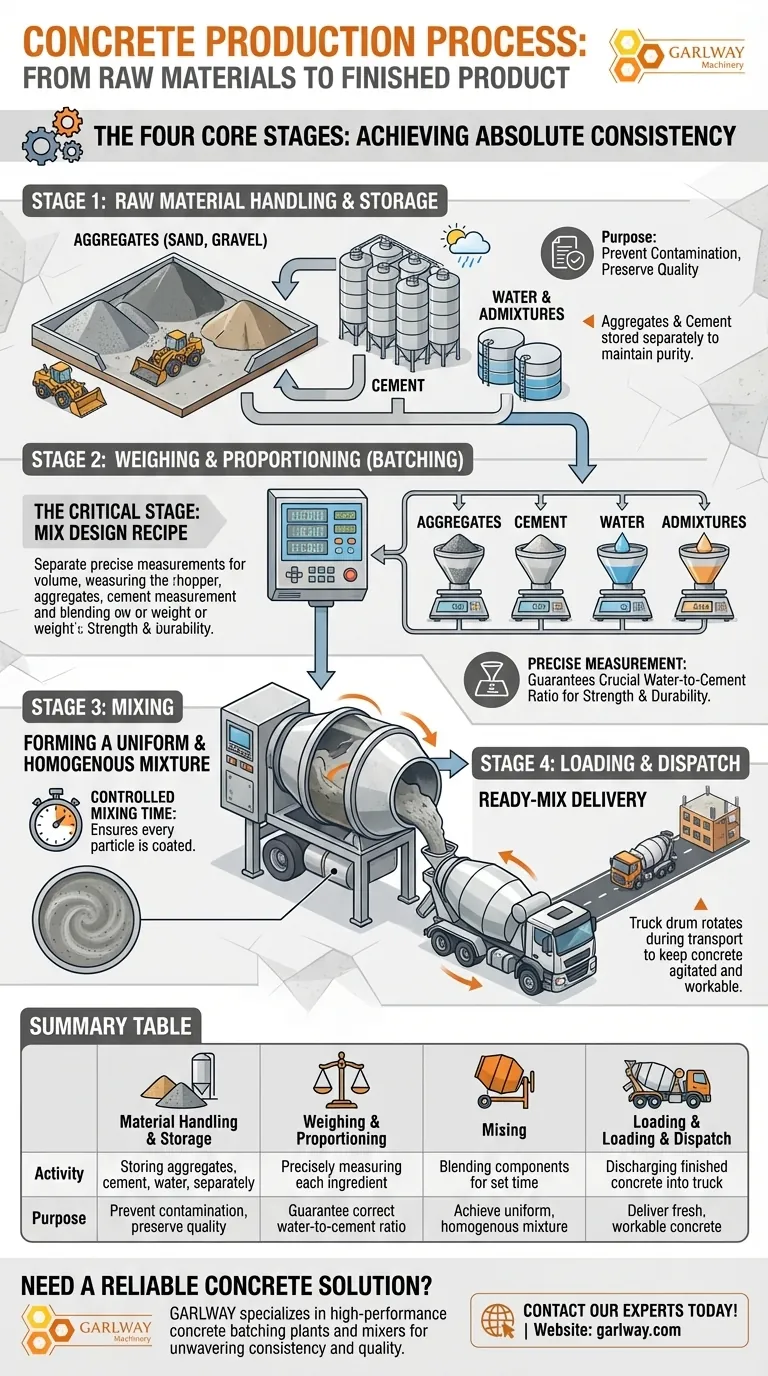The production of concrete is a meticulously controlled industrial process centered in a facility known as a batch plant. It involves four primary stages: handling and storing raw materials, precisely weighing and proportioning them into a batch, thoroughly mixing them into a homogenous product, and finally, loading the finished concrete for transport.
The core principle of a concrete batch plant isn't just mixing ingredients; it's about achieving absolute consistency. Every stage is engineered to ensure each batch of concrete precisely matches the required design specifications for strength, workability, and durability.

The Four Core Stages of Concrete Production
The entire operation is a linear flow designed to transform raw components into a highly specific construction material. Each stage builds upon the last, with precision being the paramount concern throughout.
Stage 1: Raw Material Handling and Storage
Before any mixing can occur, the core ingredients must be stored properly to maintain their quality. These include aggregates (sand, gravel), cement, water, and chemical admixtures.
Aggregates are typically stored in large open-air stockpiles or in sectioned bins. Cement is stored in tall, weather-proof silos to protect it from moisture, which would cause it to harden prematurely.
This separation is critical. It prevents cross-contamination and ensures that each ingredient can be drawn for measurement in its pure, intended state.
Stage 2: Weighing and Proportioning (Batching)
This is the most critical stage for determining the final quality of the concrete. The specific recipe, or "mix design," dictates the exact weight of each component needed for a single batch.
Using a computerized control system, the aggregates are fed into a weighing hopper. Separately, cement is weighed from the silo, and water and any liquid admixtures are measured by volume or weight.
This individual and precise measurement is non-negotiable. It guarantees that the crucial water-to-cement ratio and other proportions are met, which directly controls the concrete's ultimate strength and performance.
Stage 3: Mixing
Once weighed, all the individual components of the batch are conveyed and discharged into a large, powerful central mixer.
The mixer's job is to blend the materials until they form a completely uniform and homogenous mixture. The mixing time itself is a controlled parameter to ensure every particle of aggregate is coated with cement paste.
Stage 4: Loading and Dispatch
After the specified mixing time is complete, the fresh, ready-mix concrete is discharged from the mixer.
It is typically funneled directly into a transit mixer truck. The truck's drum rotates during transport to the construction site, keeping the concrete agitated and preventing it from setting. This completes the production process at the plant.
Common Pitfalls and Why Precision Matters
While the process seems straightforward, the entire system is designed to mitigate risks that could compromise the concrete's integrity. Deviations at any stage have significant consequences.
The Risk of Improper Batching
Even small errors in the weight of cement or water can drastically alter the concrete's strength. Too much water creates weaker, more porous concrete, while too little makes it unworkable. The automated weighing systems are there to eliminate this human or mechanical error.
The Impact of Contamination
Poor storage practices that allow mud to mix with aggregates or moisture to enter a cement silo can ruin a batch before it's even made. The integrity of the raw materials is the foundation of the final product's quality.
Inconsistent Mixing
Under-mixing results in a non-uniform product with pockets of aggregate and cement paste, leading to weak spots. Over-mixing can begin to break down the aggregates. The automated, timed mixing cycle is designed to achieve the ideal, consistent blend every time.
How to Apply This to Your Project
Understanding this process allows you to better specify and verify the materials for your construction needs.
- If your primary focus is large-scale, continuous supply (e.g., major infrastructure): You need a high-capacity, stationary ready-mix plant known for its rigorous, automated quality control to ensure consistency across thousands of cubic meters.
- If your primary focus is a specific, on-site need (e.g., precast elements or remote construction): A dedicated or even a mobile batch plant provides greater control and eliminates the risks and delays associated with transporting fresh concrete over long distances.
Ultimately, a concrete batch plant transforms basic raw materials into a high-performance engineering product through a system of unwavering precision and control.
Summary Table:
| Stage | Key Activity | Purpose |
|---|---|---|
| 1. Material Handling & Storage | Storing aggregates, cement, water, and admixtures separately. | Prevent contamination and preserve material quality. |
| 2. Weighing & Proportioning (Batching) | Precisely measuring each ingredient according to the mix design. | Guarantee the correct water-to-cement ratio for strength and durability. |
| 3. Mixing | Blending all components in a central mixer for a set time. | Achieve a uniform, homogenous concrete mixture. |
| 4. Loading & Dispatch | Discharging finished concrete into transit mixer trucks. | Deliver fresh, workable concrete to the construction site. |
Need a Reliable Concrete Solution for Your Project?
GARLWAY specializes in providing high-performance construction machinery, including robust concrete batching plants, concrete mixers, and winches, designed for construction companies and contractors worldwide.
Whether you're managing a large-scale infrastructure project requiring continuous supply or a specific on-site application needing precise control, our equipment ensures the unwavering consistency and quality described in this process.
Let us help you achieve superior results. Contact our experts today to discuss your specific requirements and find the perfect concrete production solution!
Visual Guide

Related Products
- HZS35 Small Cement Concrete Mixing Batch Plant
- HZS75 Concrete Batching Plant Cement Mixer Price Concrete Mixer Bunnings Mixing Plant
- HZS180 Ready Mix Concrete Plant for Foundations with Sand and Cement
- JZC400 Mobile Small Concrete Mixer Cement Mixer Machine
- HZS120 Ready Mix Concrete Batching Plant Commercial Mud Cement Mixer
People Also Ask
- What are the components of concrete mixing? Master the Ingredients and Machinery for Perfect Results
- How does a small cement mixer improve time efficiency? Automate Mixing & Boost Productivity
- What happens in a concrete batching plant? Discover the Automated Process for Perfect Concrete
- How can the discharging stage be optimized to improve overall concrete mixing efficiency? Fix the Mixer-to-Vehicle Handoff Bottleneck
- How much does a batching plant cost? Uncover the True Investment for Your Project














